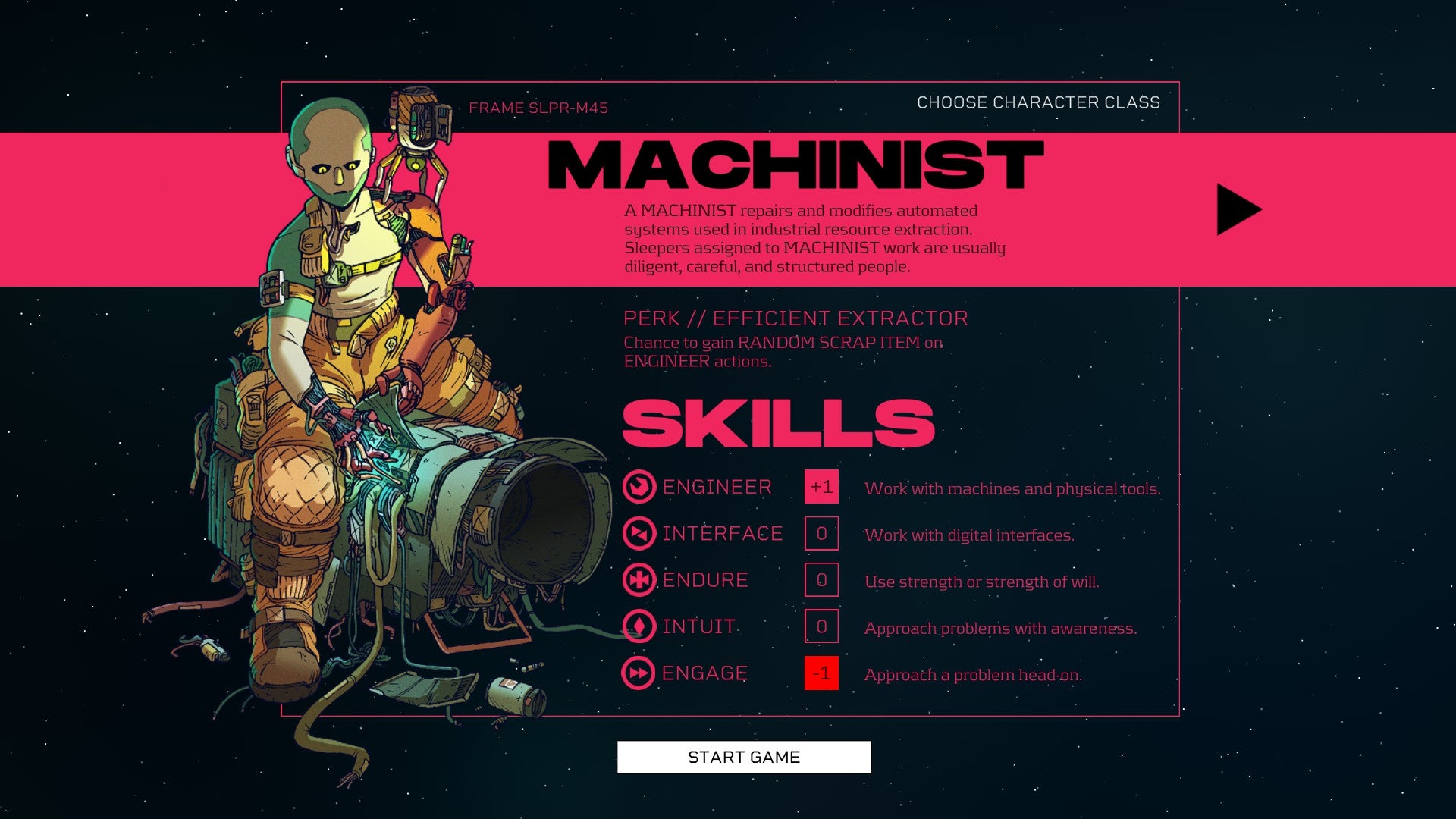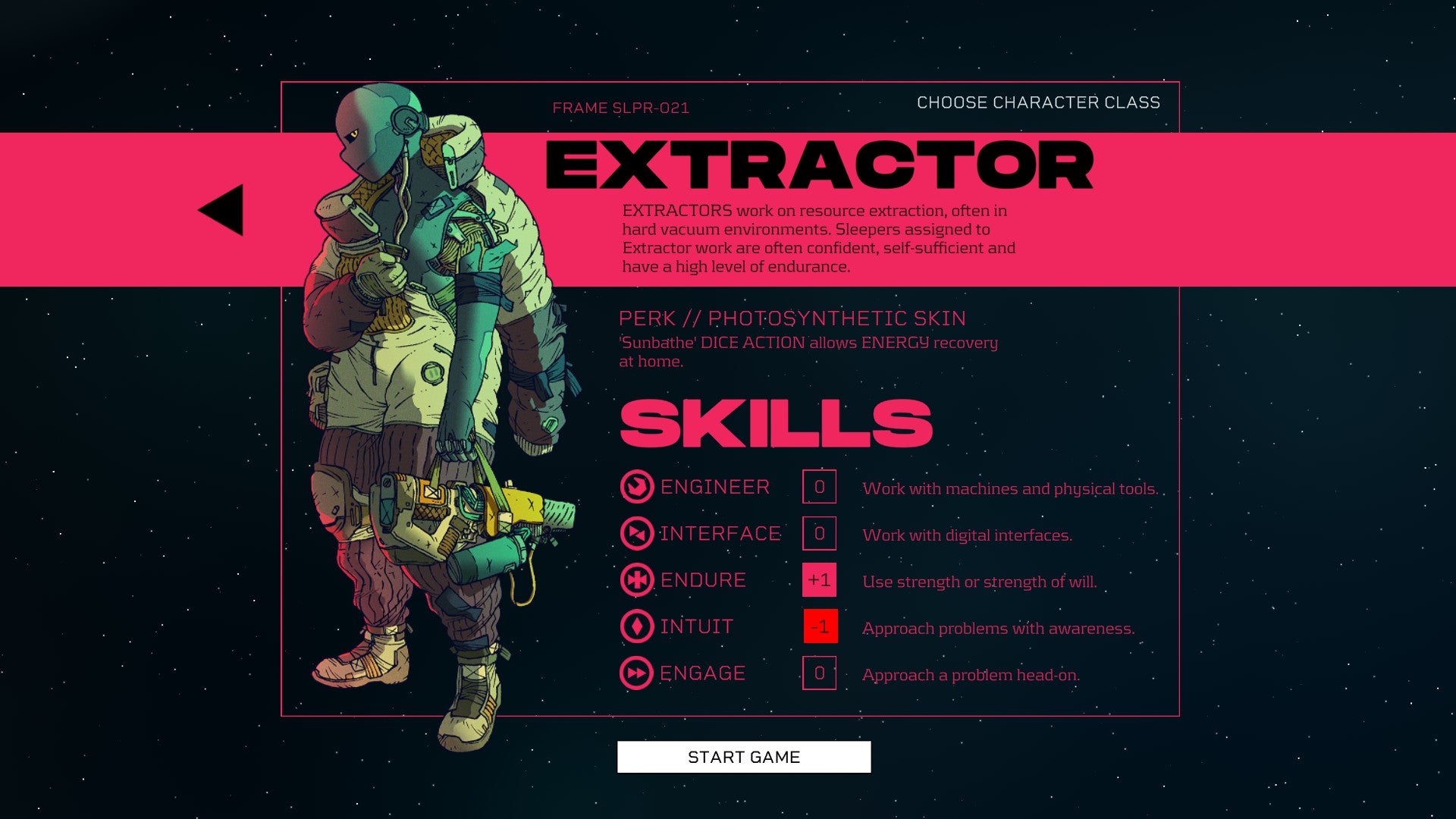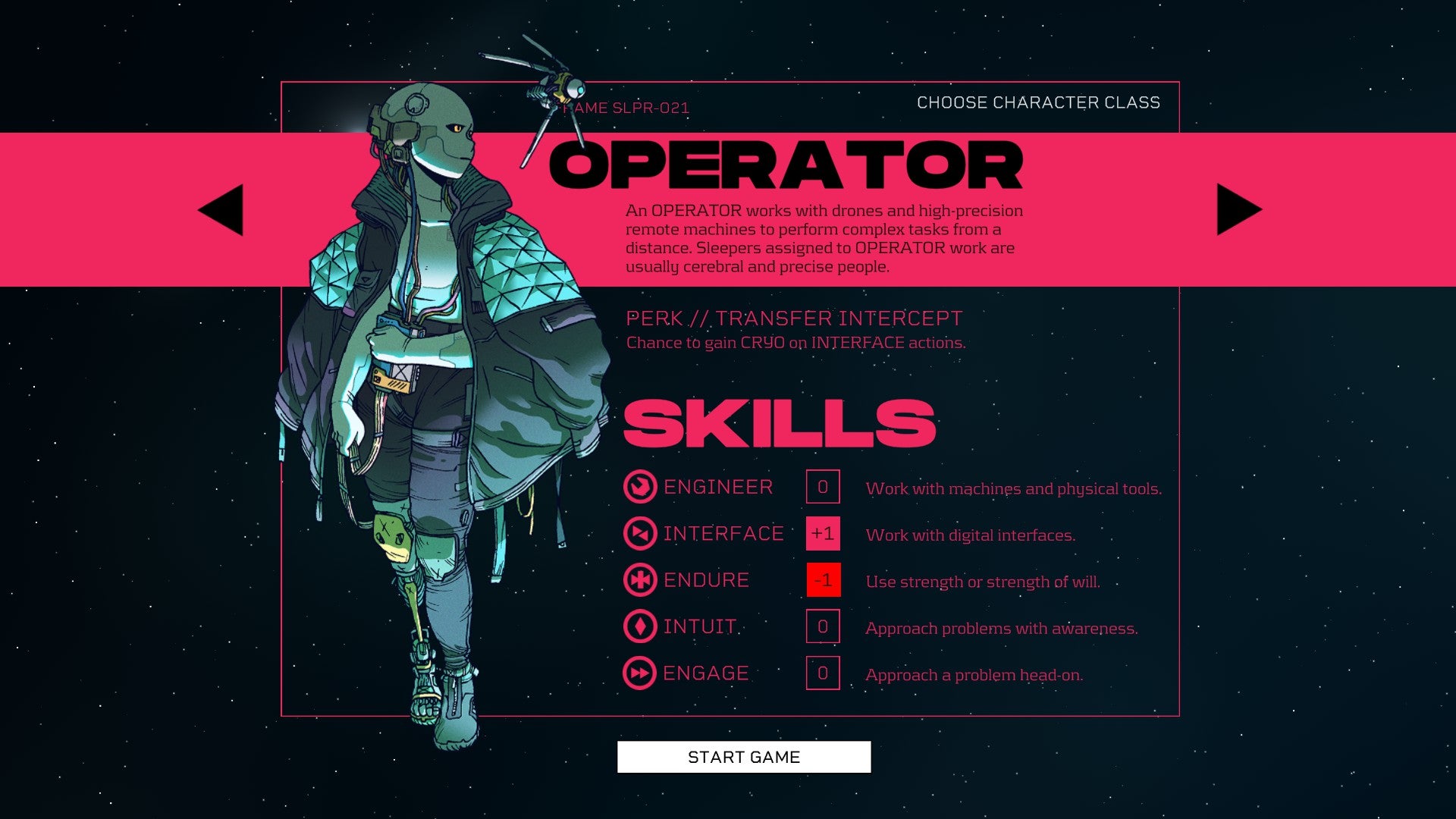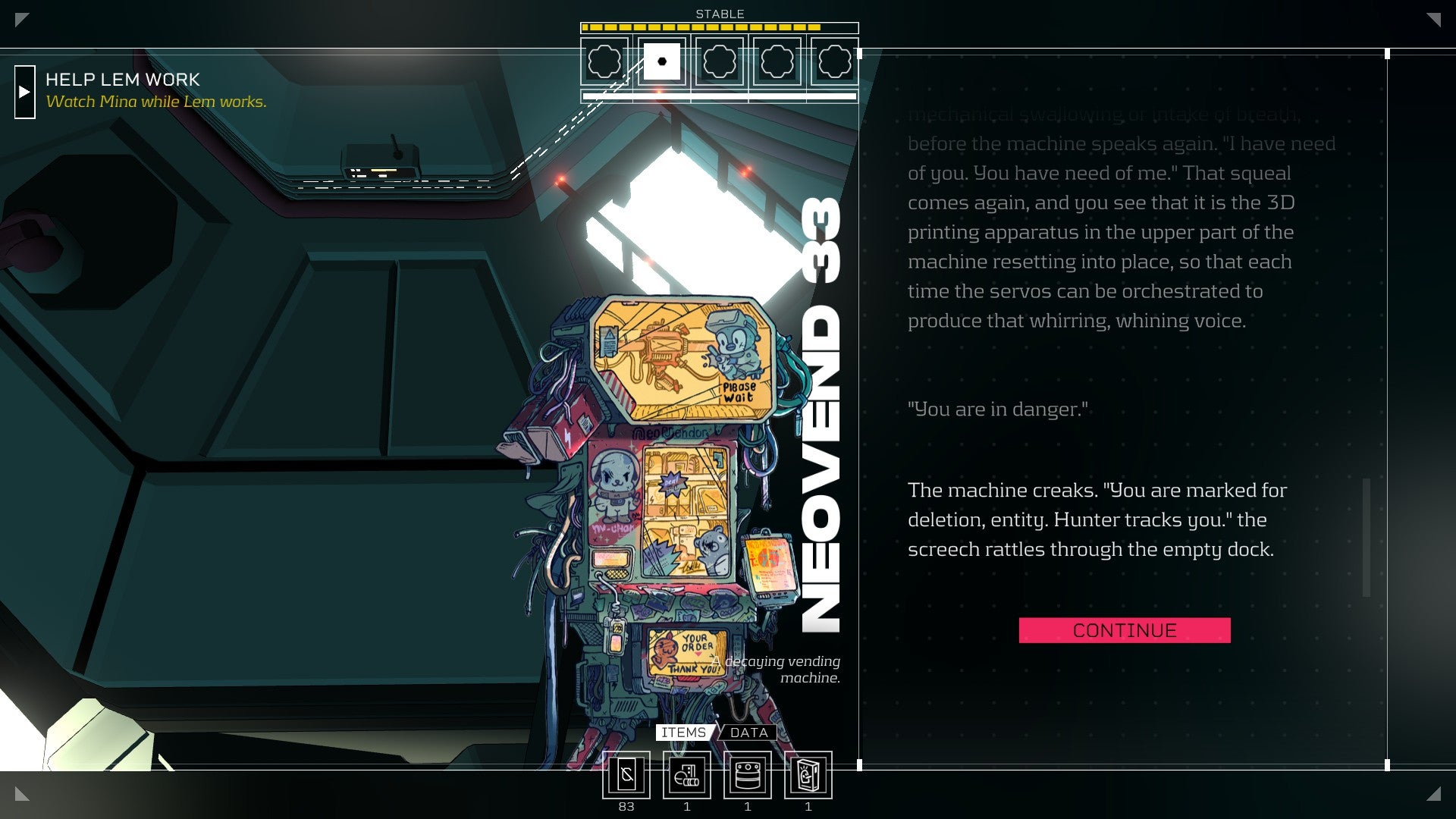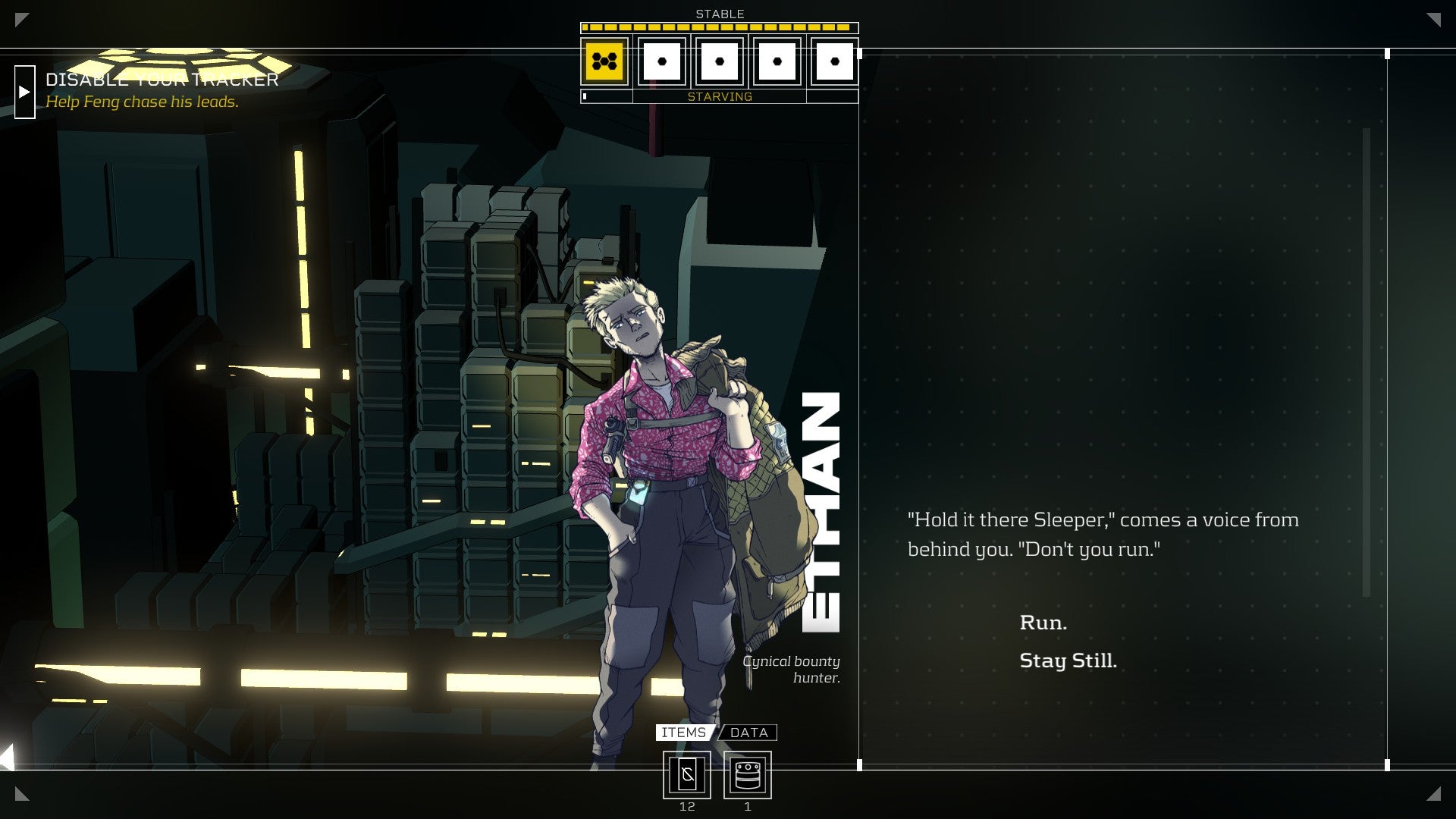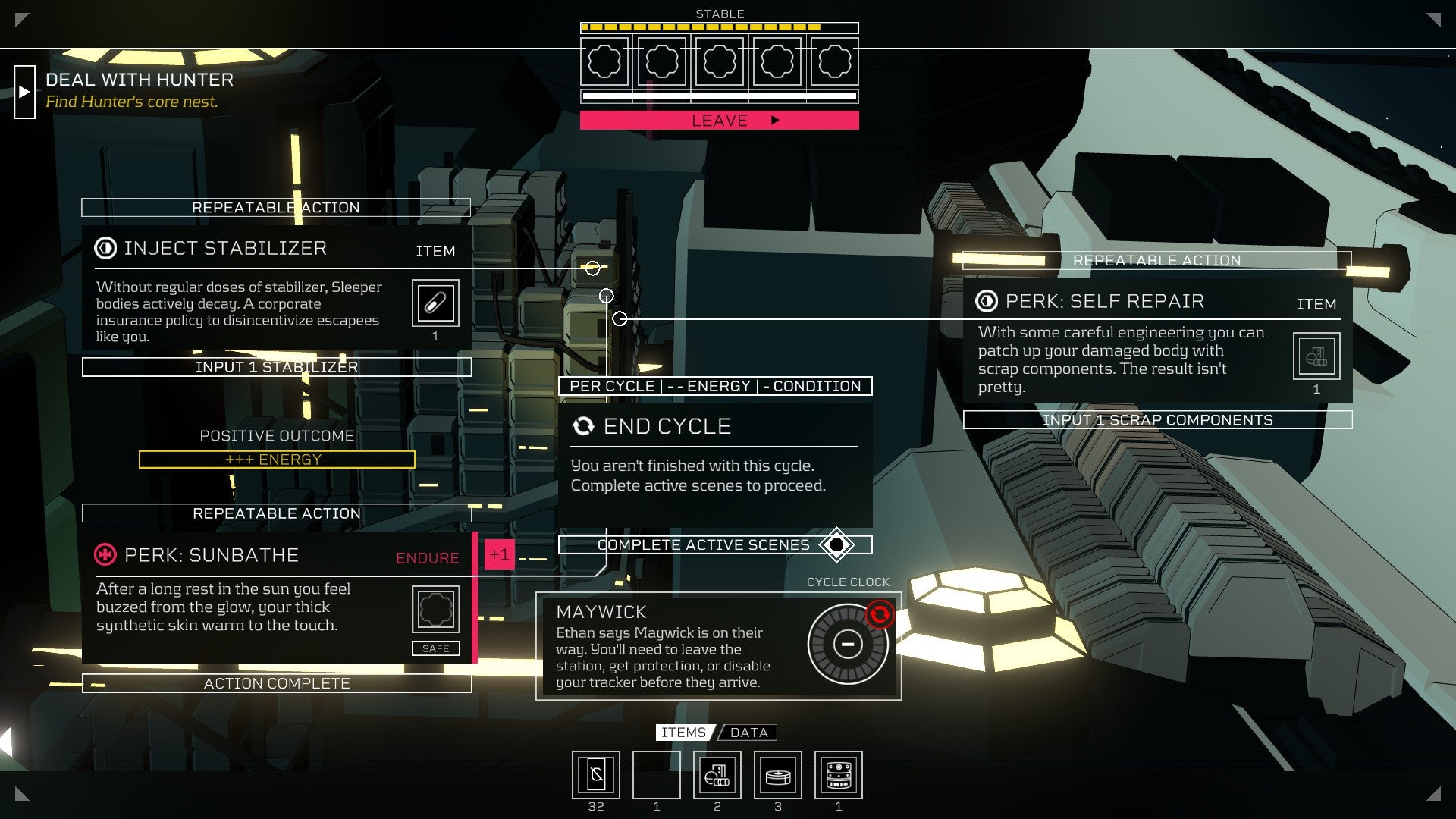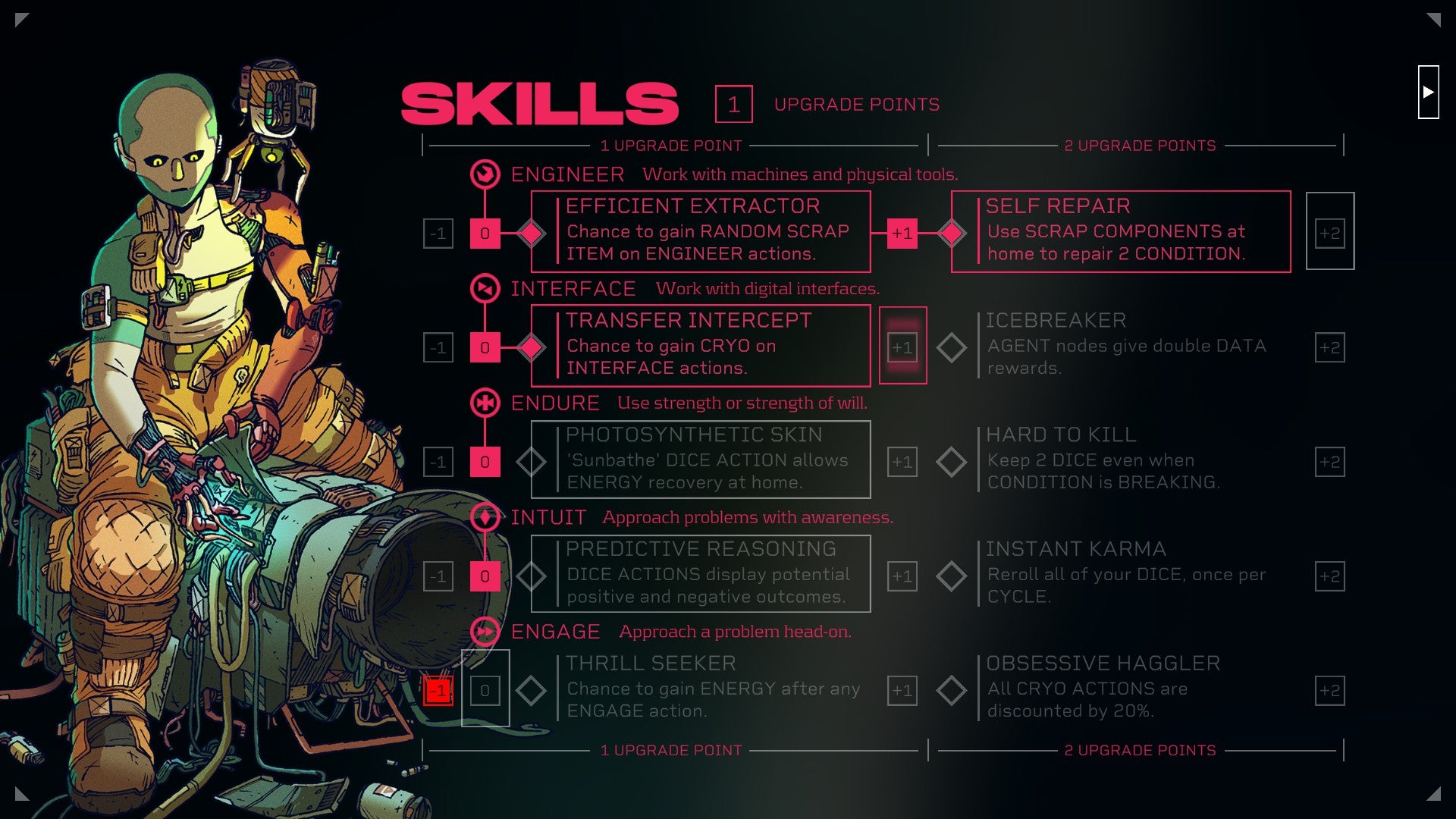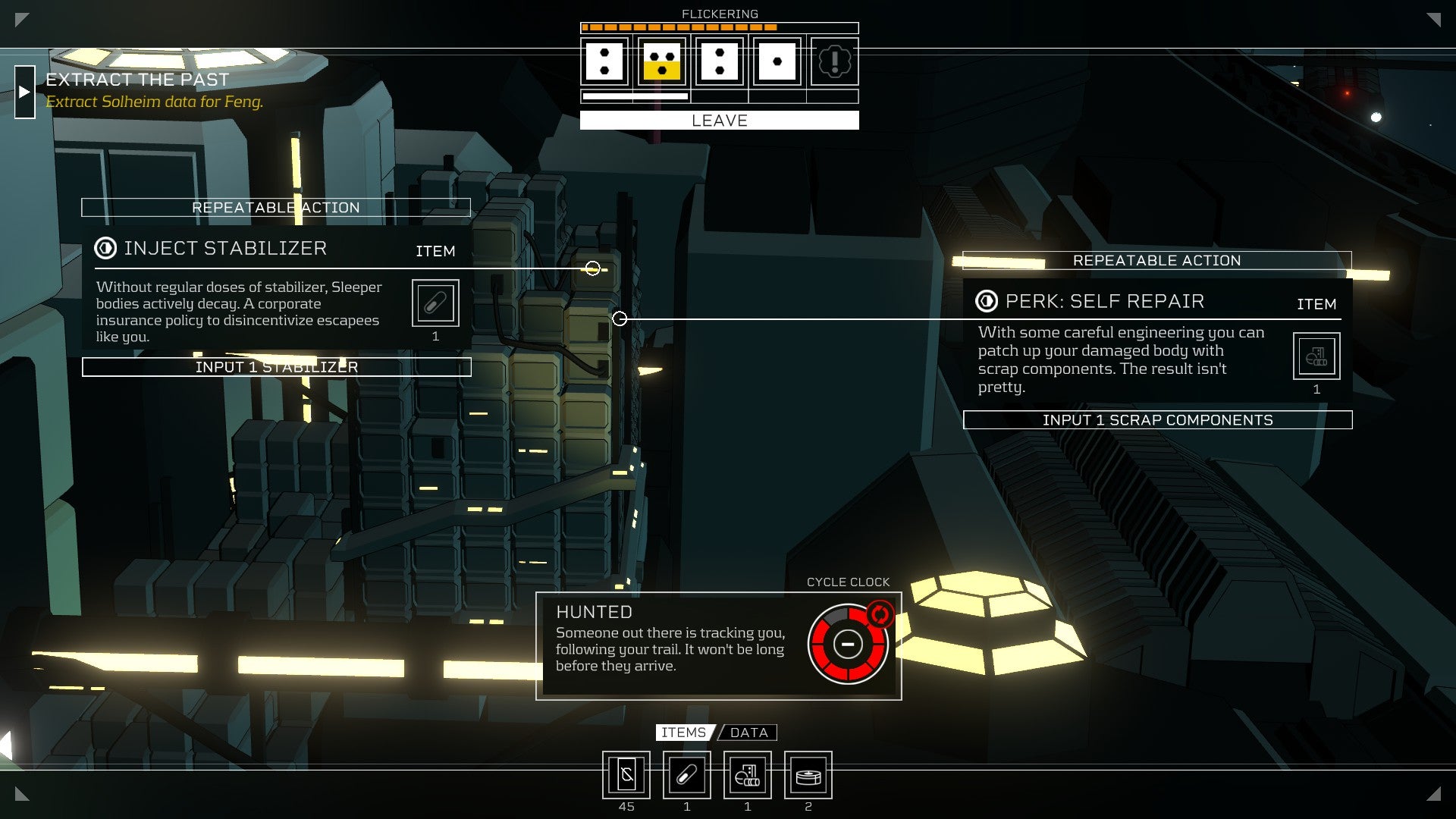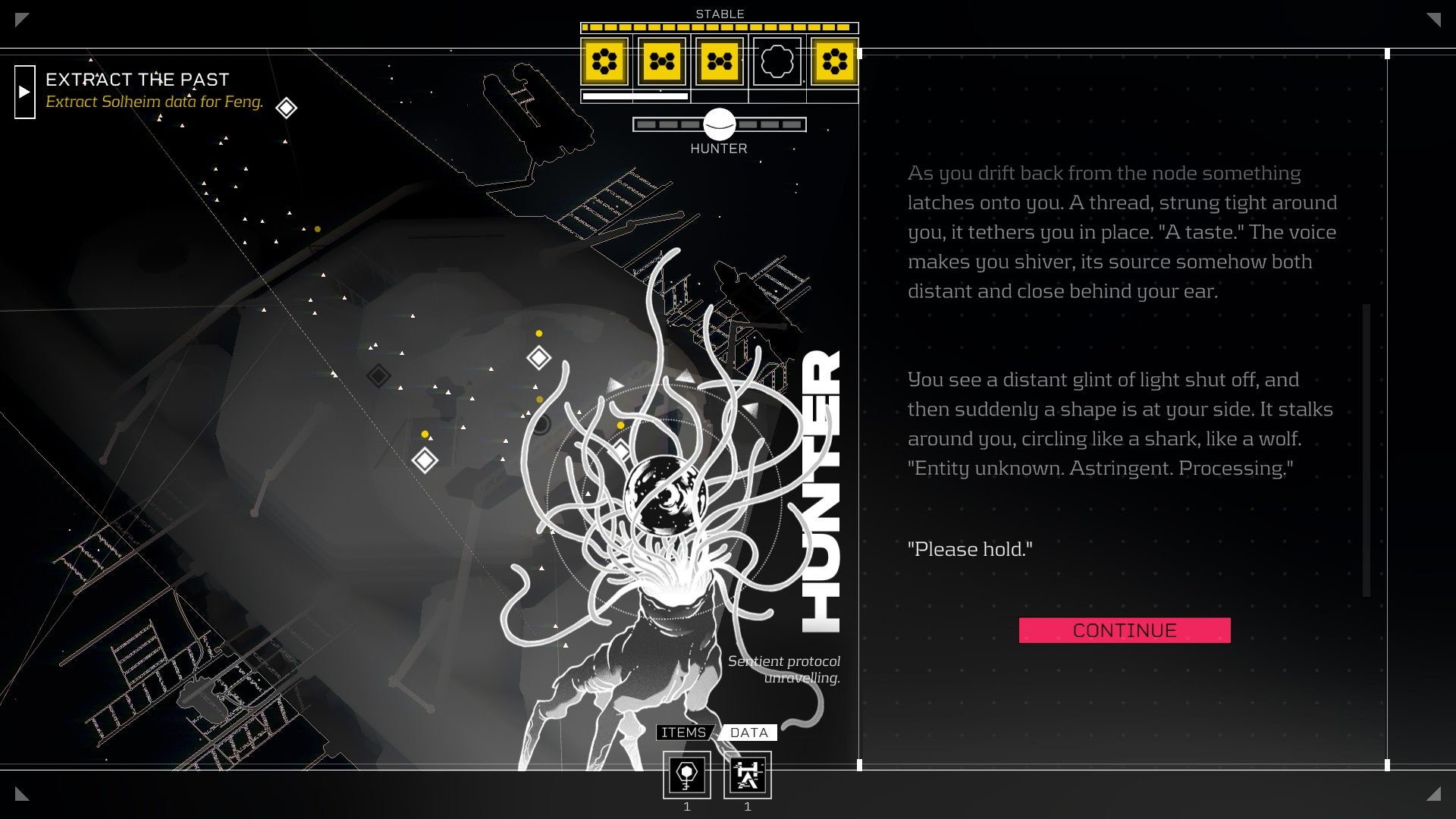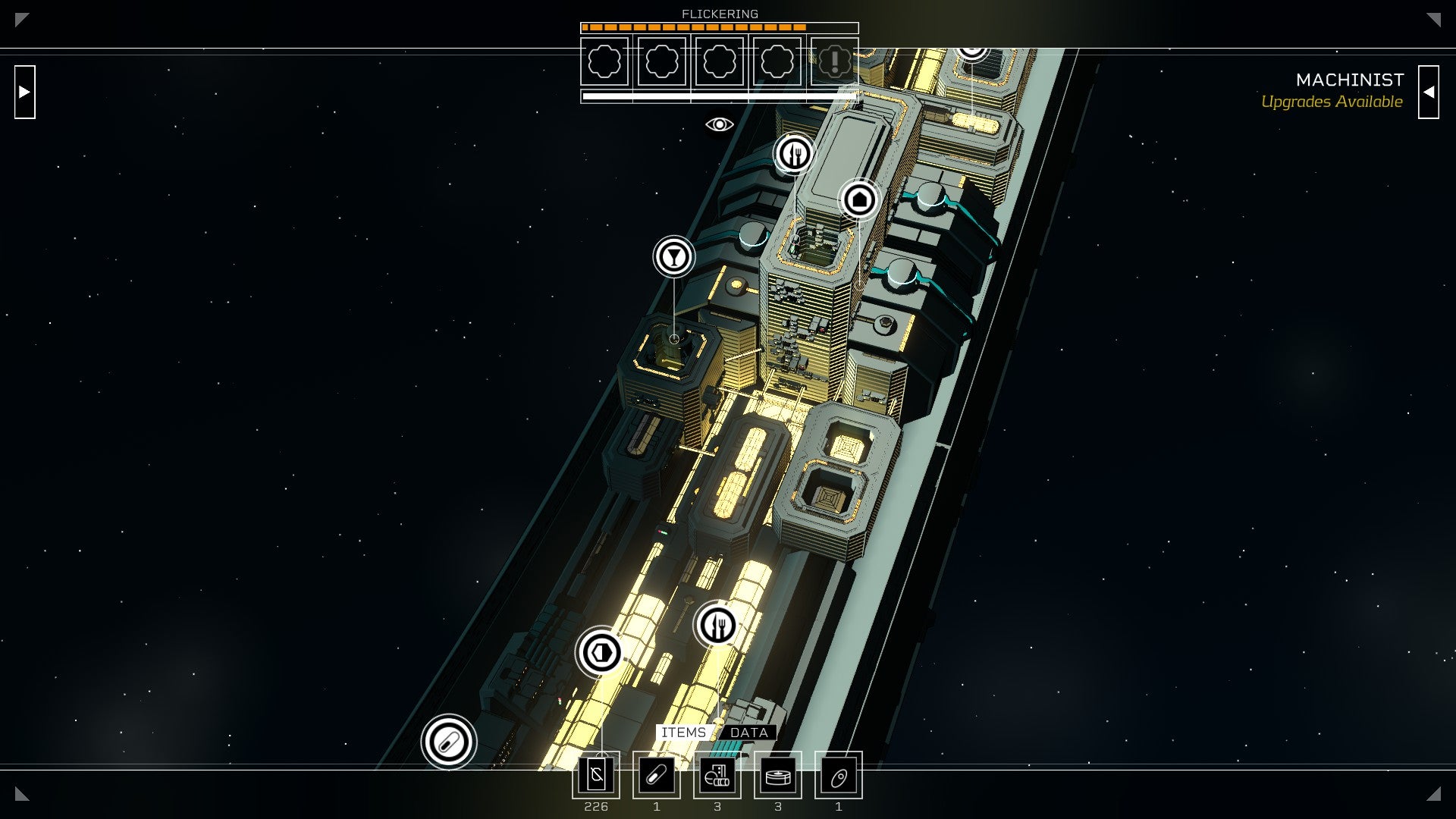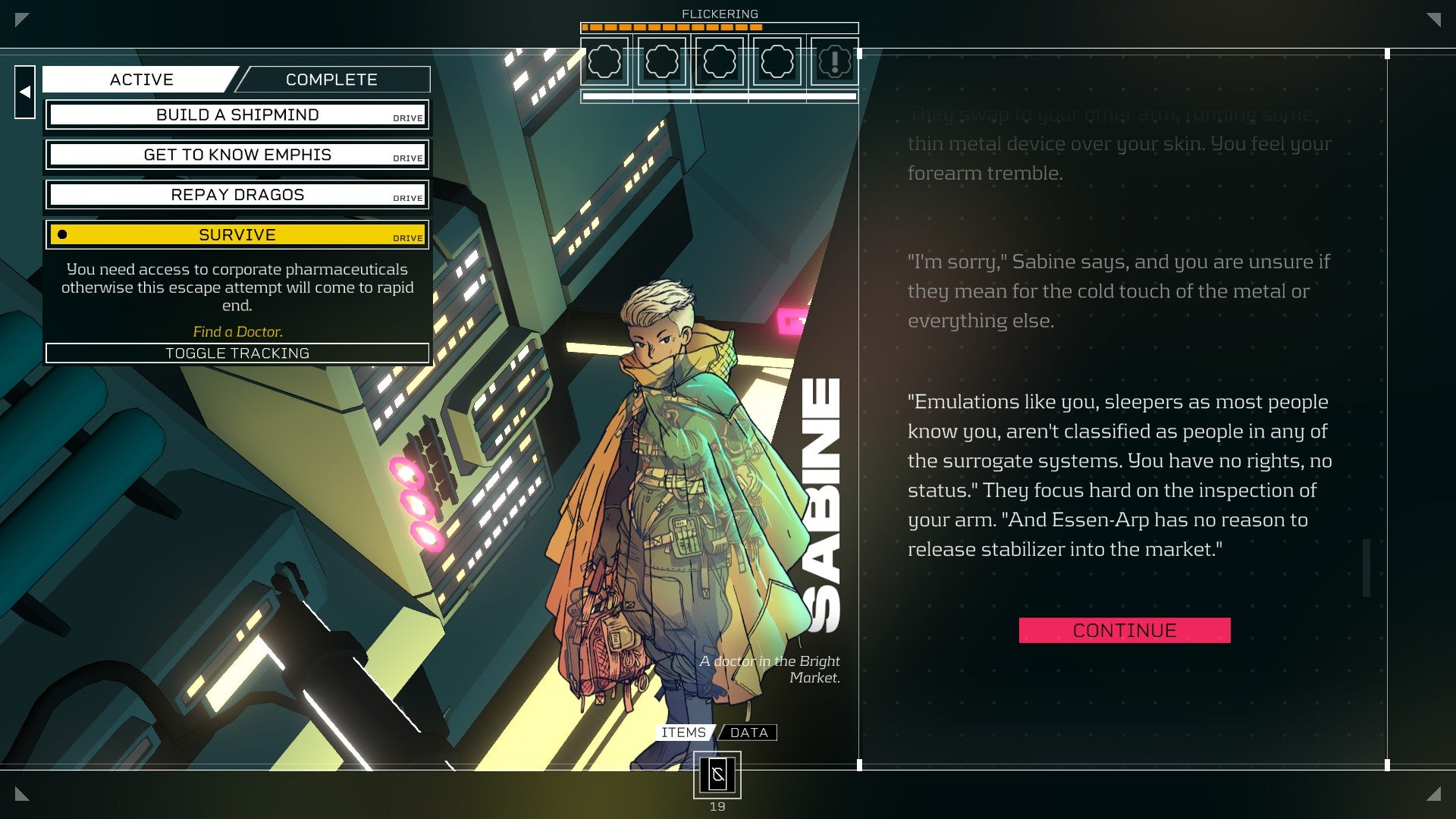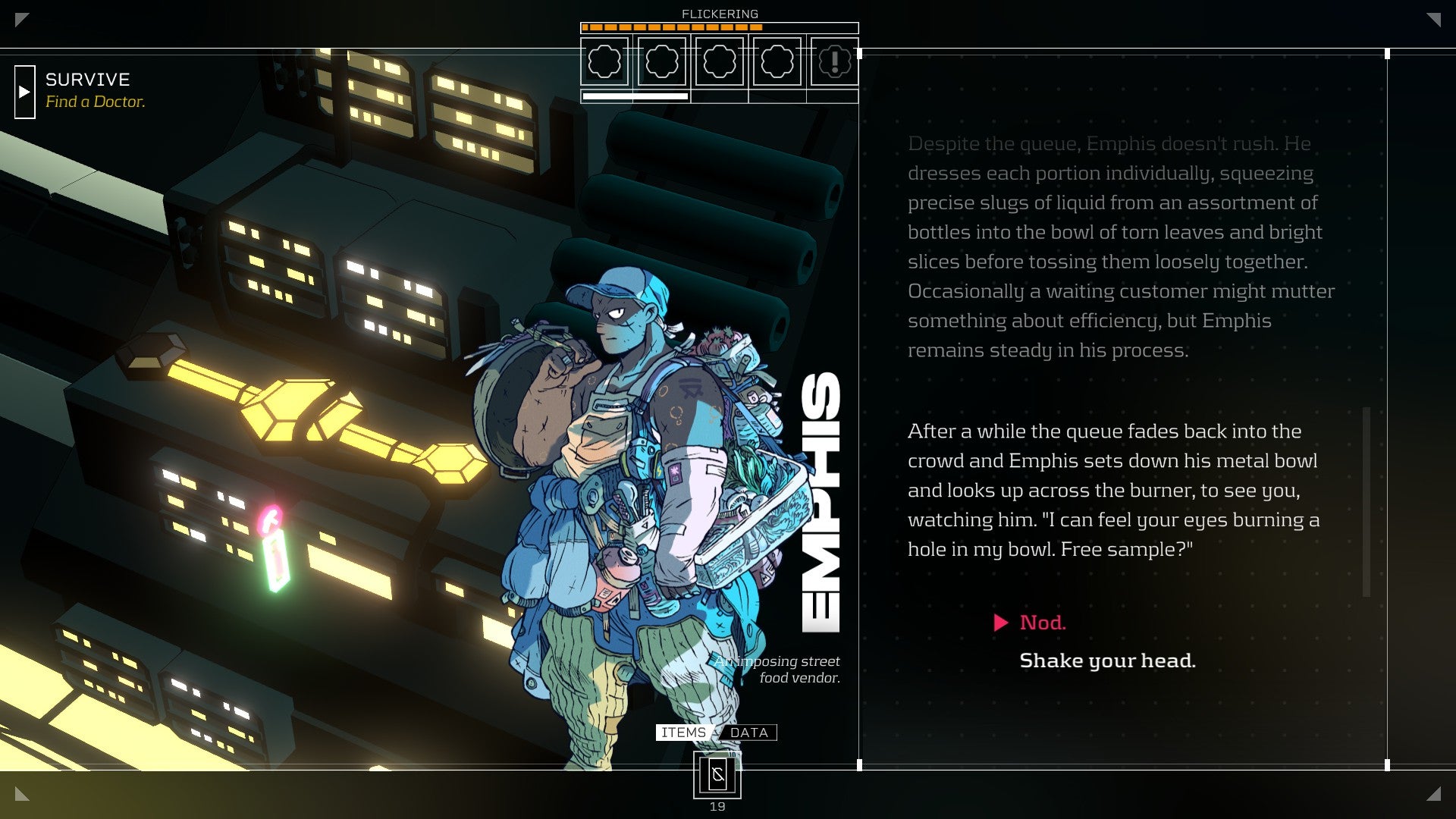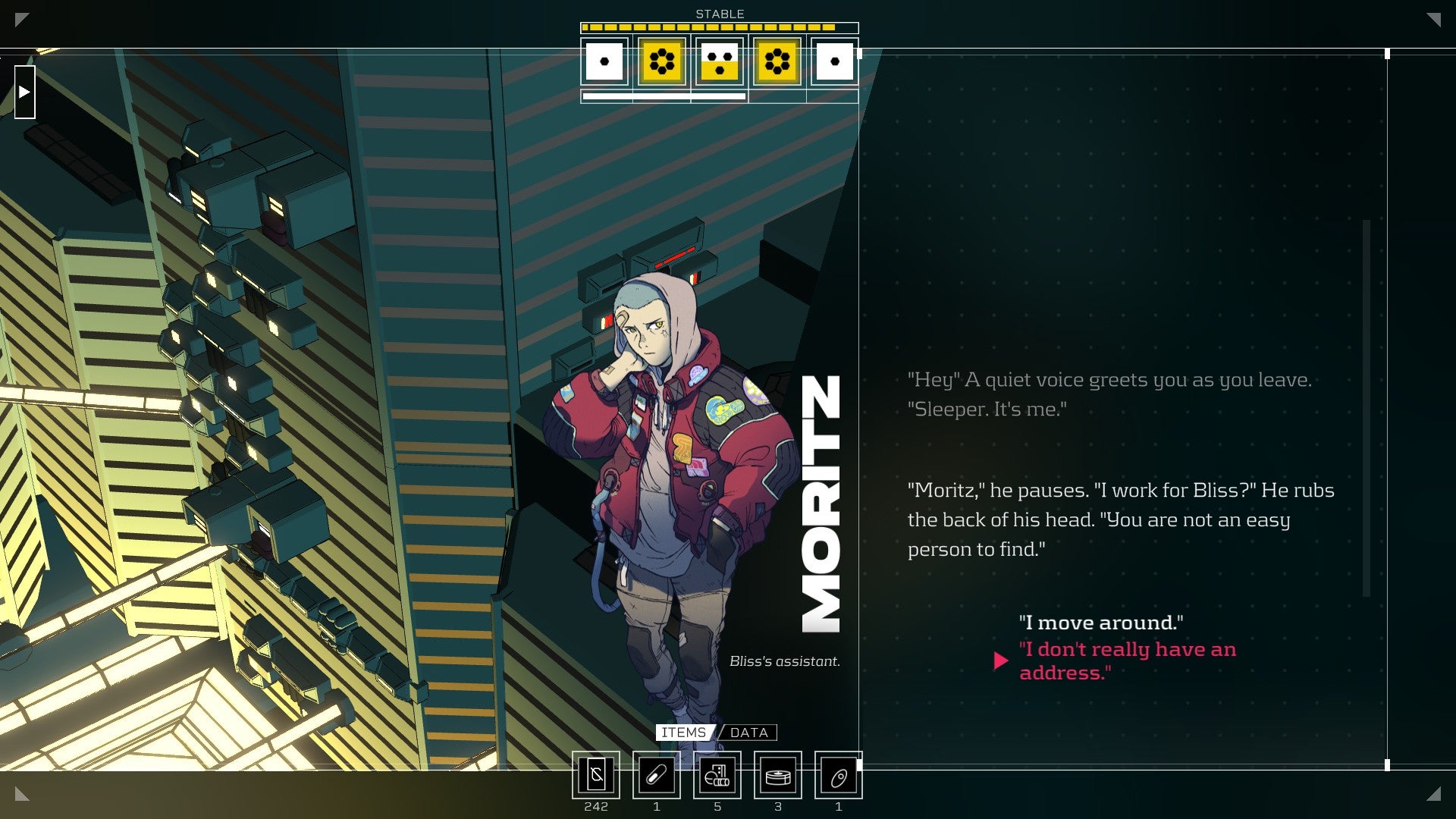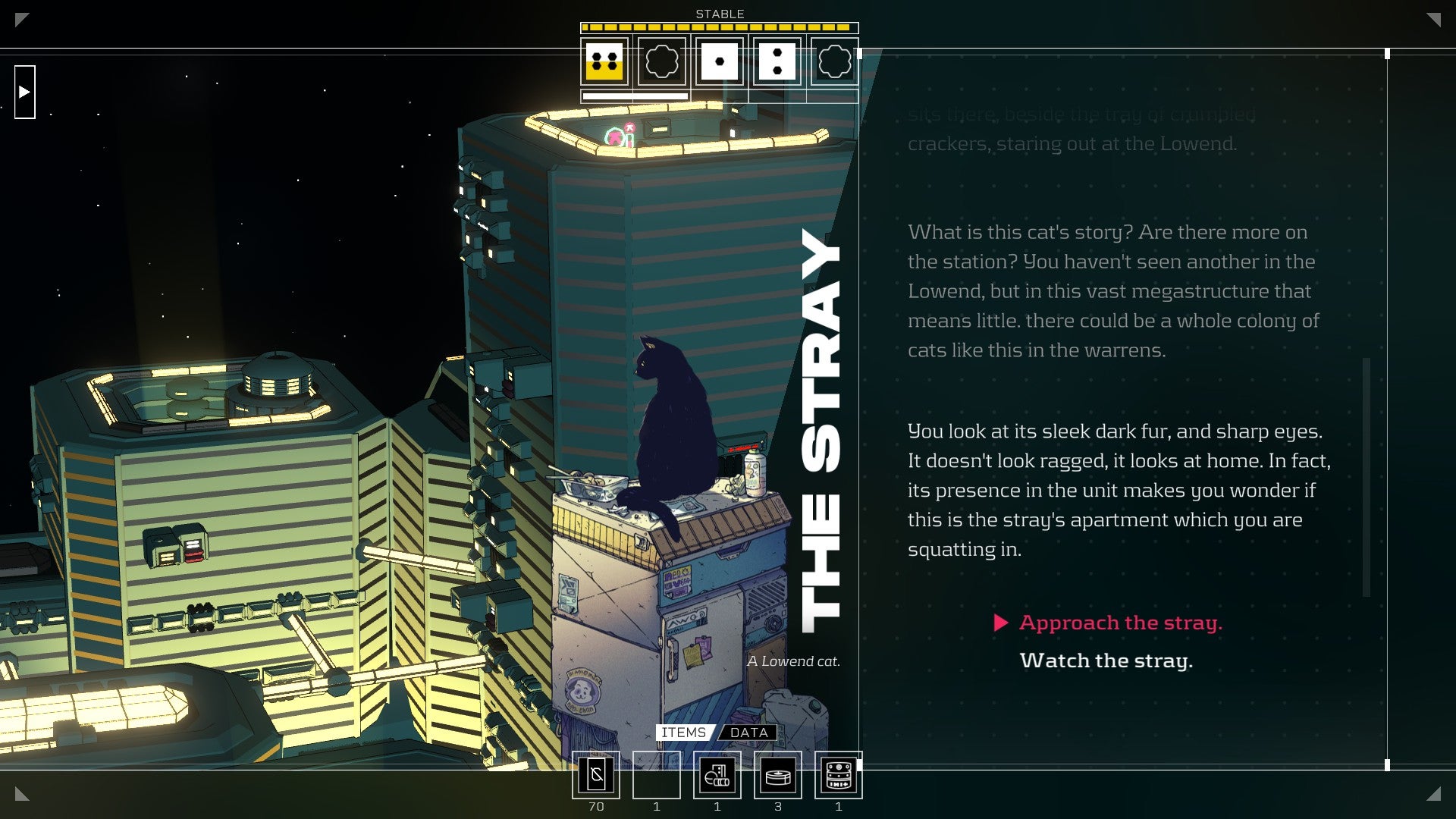Walking it back for a second, initially, you are in a fight for survival - or, less of a two-way fight and more one-way struggle. You are a Sleeper, a corporate-owned, replicant-on-a-budget entity with a generic, robotic body and emulated mind, based on a real human but with reduced memories and even fewer rights, unsure of whether that’s enough to even count as being alive (yes, a Descartes reference comes up - but it’s a fun one). Arriving here, post escape, on the space station called the Eye, you have two key resources to manage: your condition, a bar of 20 little blocks that decreases by one each time you end a turn, sleeping at the end of a day here referred to as completing a ‘cycle’; and your energy, made up of five bars that drops by two each time. These dovetail nicely. Run out of energy and your condition will decrease much more rapidly; run out of condition and it’s game over (in theory - I haven’t run out just yet, touch wood) - and they connect again with your other key resource of sorts: dice. Citizen Sleeper is built on the principles of a tabletop RPG - deftly, I should say - and so depending on how full your condition bar is, you roll between one and six dice on waking up after each cycle’s nap. The higher the condition the more dice you have, and these dice are then assigned by you to… whatever you want. This may sound clunky; believe me when I tell you that’s my fault. Citizen Sleeper is the opposite. It’s one of those games that actually appears a little thin and weightless at times, certainly during its somewhat slow start, pared back to a remarkably clean, paper-thin-lined UI, but what that really creates is a wonderful elegance. Elegance of the tabletop kind, a couple of systems at most, a character and then just empty space, room exclusively left for you - your choices, your imagination, your self. A rare game that knows how to get out of its own way. So, back to the nature of it. In the beginning you are scrabbling around for work, sleeping in an empty shipping container, picking up odd-jobs for Chits, short for Cryo, short for something else that I gather is basically space-crypto. It’s money, which as ever turns the world of the Eye, and which at first, along with your precious dice, is what you need to buy some not-inexpensive noodles for energy, to get scrap or parts or recurring, ever-expensive, illegal medicine to stave off the ‘planned obsolescence’ of your built-in condition decay. It’s a lot to juggle, for a thing that seems so simple at a glance. Quickly it evolves into favours for potential friends, but for each of those there’s an obligation to a potential partner, a debt to someone else. Beyond that there’s another race against time, as bounty hunters arrive seeking to claim back the company property that you are, as new acquaintances unravel mysteries that might save you from the endless hunt - as another hunter stalks you in the cloud, a kind of digital subconscious, a Matrix connecting you to the mainframe of all the machines and quasi-minds of the station and allowing you to hack others to your benefit, at the risk of being marked for deletion by whatever lurks there in the fog. All these things stack and stack and stack, a purposefully overwhelming to-do list of social contracts that purposefully cannot be crossed off at once. As with much of Citizen Sleeper the allegory is obvious and overly memed - tag yourself if you, too, can’t find the time to go to the gym, cook healthy meals, excel at work, see your friends, care for family members, go on date nights, read more books, and heaven forbid maintain a hobby or two; or more pertinently to Citizen Sleeper’s point, if you can’t afford to pay for both insulin and rent. But what shines, and what drags your drowning self up from under a sea of busywork and base survival, is that relentless, unyielding human warmth. At first it’s the people of Citizen Sleeper. Quiet, sheltered, guarded types, desperate for a deep connection if only the other person could do a bit more of the social legwork - a world that does at times feel entirely populated by terminally-online introverts draped in snuggly jumpers and flanked by monstera plants (guilty) - the people of the Eye, given the effort from you, will blossom from initial caricatures into pensive, capricious, resentful, protective, generous, loyal and treacherous humans, all the wrinkles and creases of humanity written with fine strokes of real expertise. A stab in the back or clever heel-turn is all that stands between you and the end of a playthrough. Or so it seems - this is where Citizen Sleeper’s kindness comes in, often, seemingly, willing you back to life from the edge of apocalypse. It’s a game that builds a world that’s out to get you on the surface, ostensibly difficult and hostile, but also desperate for you not to fail, repeatedly dragging you back from the brink of what really might feel like a bad decision or dialogue choice. Soon after, reaching the end of certain characters’ questlines and fleshing out your skill tree, having peeled back the long map of the Eye like tearing the lid off a tin of sardines, you might puncture through that layer of survival, the race against time, the rat-race, the systemic struggle, and suddenly there’s equilibrium, the ‘game’ is in effect over just as the post-game - the actual game - begins. When you begin you choose one of three classes, each with a +1 modifier to one of five skills in the tree and a -1 to another. As you complete tasks, labelled smartly in Citizen Sleeper as Drives (a reminder of how much of this game is really played in the mind) you gain upgrade points to put into the tree, unlocking either passive buffs that grant self-sustenance, like the ability to self-repair from scrap, or more direct boosts to the value of a die you put into corresponding tasks. (Quick example: I was a Machinist, so I had +1 Engineering from the off. That means when I put, say, a die that had rolled as a 3 into a job aligned with the Engineering skill, it counted as a 4 instead; higher dice numbers increase chances of positive outcomes, lower ones increase chances of neutral or negative ones, that might cost you money or sustenance of some other kind. Boosts to dice put into a certain skill then become a kind of self-fulfilling character class, with tasks often having two ways of being completed and you naturally being funnelled into a solution that matches your specialty). Completing enough Drives - and being smart about how you use your money, miscellaneous resources, dice - essentially allows you to punch through the upper cloud layer of Citizen Sleeper with surprising ease. Reflect for a second and it becomes fairly obvious what’s happening: when the game is survive-under-capitalism, peaceful existence in the post-game is the post-capital society. Do as you wish, having cast off your chains. Build yourself a more humane and truly meaningful life. Citizen Sleeper is nothing if not didactic, its greatest strength and also its greatest problem, in a sense. The problem with being didactic with a creative work is that the work becomes a thesis, a kind of argument you’re having with your reader, audience, player. Setting out to prove a point means building walls around yourself, anticipating comebacks, pre-countering counter arguments. It makes the thing in question feel more rigid as a result, penned in by the fact it’s inviting challenge by attempting to convince, rather than stimulate - to coerce rather than to invite. Unless it’s preaching to the choir, the fear is a result where few are converted, and most just want to push back. An example of one ‘gotcha’ is how you can min-max your way out of Citizen Sleeper’s cycle of life, to bootstrap yourself to a mass of money and comfort - the capitalist’s dream - by nothing more than force of ability and will and playing the system as it lies. This shouldn’t matter - it’s fun! And more importantly, a hugely distinct vision of how games can work, building intrinsic pleasure into the sense of static post-game mindfulness, the transcendental joy of existing free, instead of the extrinsic motivation of the grind - but when you’re making an argument, suddenly it does. Suddenly I want to say: this doesn’t line up with your message; it sort of says the opposite. Then I’m tied in knots, wondering how a kind of forced failure - the system is rigged against you is one message here, after all - could work. But it couldn’t. The same could be said for how its relationships, which Citizen Sleeper positions as ends in themselves, are all fundamentally transactional, granting you various rewards or upgrade points for helping fellow citizens out of a bind. The trap here is to conclude that the game, therefore, can’t work. It can’t tally its many, many metaphors - the private medicine; the rent-seeking; the impossible choices between human connection and survival; the corporate ownership; the communes; the cycles of abuse; the poverty trap; the slavery; the planned obsolesence; and the many times where all this subtext is just delivered as literal text - entirely justified and infallibly-reasoned as they are, with the game it wants to be. But it is a trap, and it is one you can simply opt to hop right over, to the absolute magic that’s waiting on the other side. Yes, Citizen Sleeper is keen to convince at times. At many others though, it does stimulate, it does reach for something, crucially it does feel wholly human for every second of its playtime. Its mist-grey, Neuromancer Matrix is a haze of mental interpretation. Its characters - dock workers, bartenders, chefs, gangsters, botanists, AIs - are fundamentally alive. There is real anguish and intimacy here, real experience, real softness, pensiveness, complexity of thought, from the deeply clever, immaculately balanced systems to its extraordinarily well-realised art, static drawings of those characters that each feel like a glossy, coffee table magazine cover of their own, such is the incredible texture, colour, posture, pain behind the eyes. Citizen Sleeper is speaking to you, but in this case I really recommend you simply listen - not least because there’s depth to be found in your own silence, and because the things it does have to say are absolutely worth hearing.

